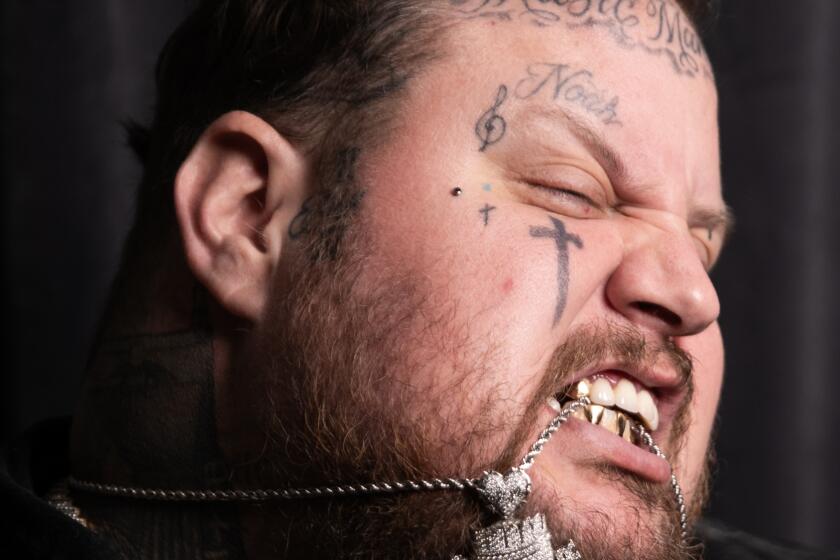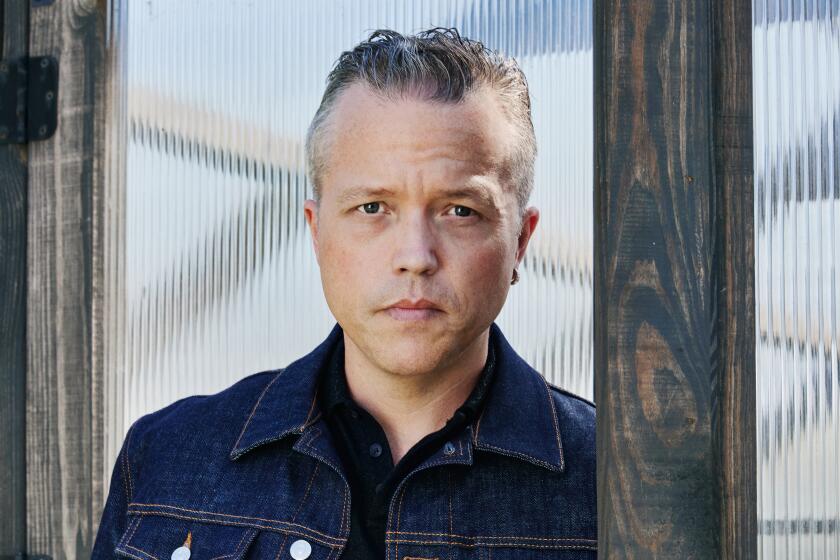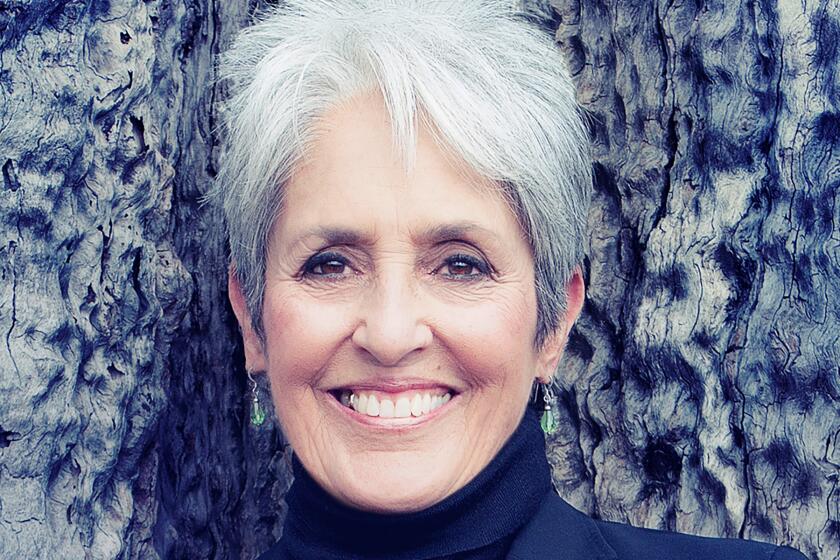Allison Russell has been through hell. So why is her new album so damn joyful?
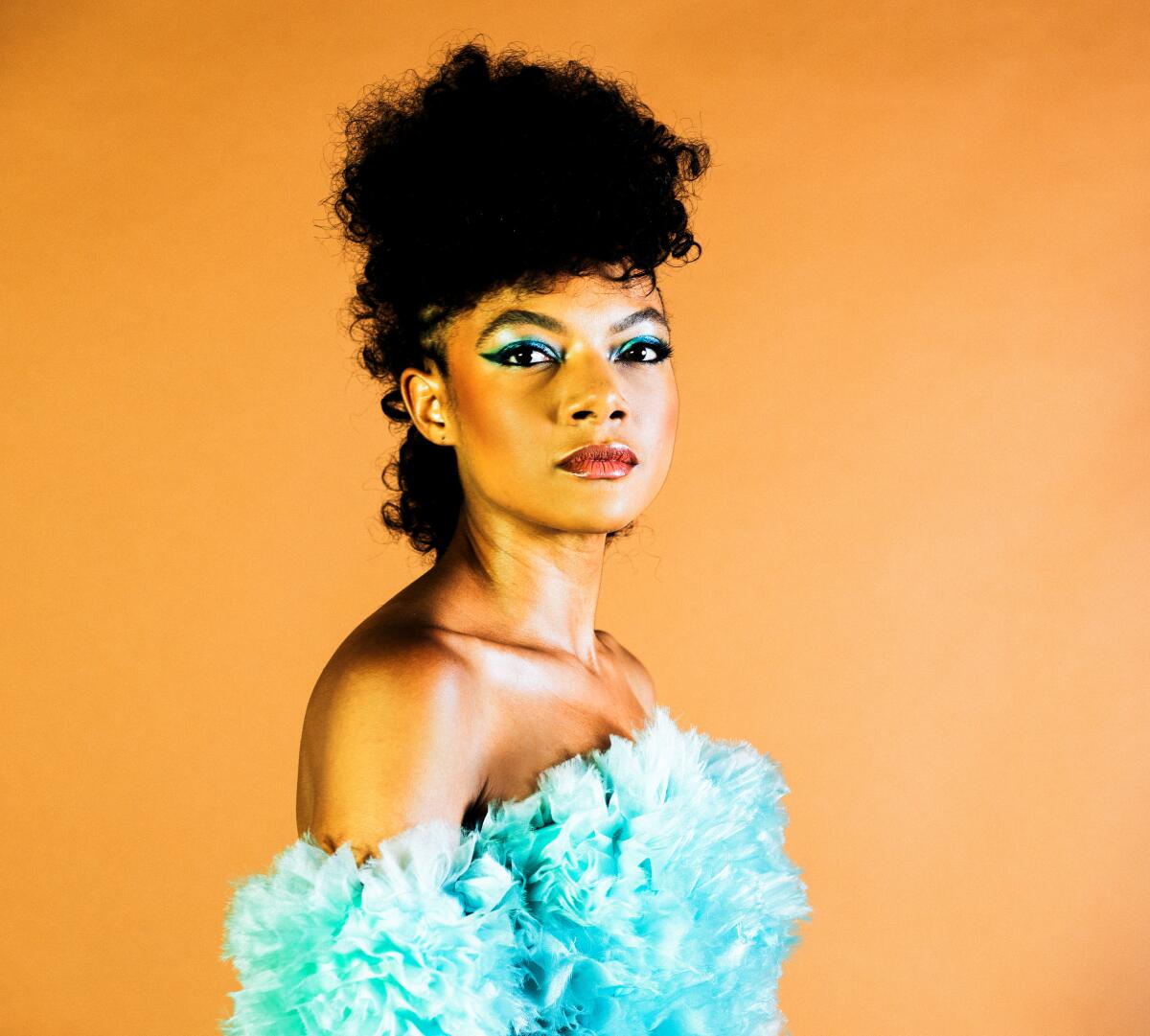
- Share via
Allison Russell opens her exultant new album with a goodbye.
“So long, farewell, adieu, adieu,” she sings, her voice as unbothered as a breeze, at the top of “Springtime,” the jaunty folk-soul number that invites listeners into her sophomore LP, “The Returner.” A Canadian-born singer, songwriter and multi-instrumentalist who plays clarinet and banjo, among other things, Russell is describing her exit from “that tunnel I went through,” and anyone who heard her acclaimed 2021 solo debut, “Outside Child,” is sure to know what she means.
That album directly addressed the sexual abuse Russell suffered as a child by her adoptive father; it also earned several Grammy nominations and beat higher-profile efforts from Brandi Carlile and the duo of Robert Plant and Alison Krauss to win album of the year at the Americana Music Assn.’s annual awards ceremony in 2022.
Now Russell is moving on: After “Springtime’s” callback to that dark chapter — “I used to think that I was doomed / To die young, to be consumed,” she confesses — “The Returner” maps a forward path of healing and even begins the work of finding forgiveness for her abuser.
“‘Outside Child’ was a chronicling of the past, but this record is the present,” says Russell, 41. “It’s a re-embodiment — a coming back into my own body and celebrating it despite all the scars and bruises and the trauma I survived.”
Russell’s reclamation of her physical self — of the possibility that a body might be amenable to pleasure — defines the songs on “The Returner,” which are more luscious and groove-oriented than those on the more cerebral “Outside Child.” “Stay Right Here,” a yearning pop tune which puts her slightly raspy voice against tart disco strings, recalls “I Will Survive,” while “Shadowlands” climaxes with a throbbing punk-funk breakdown. The shuffling “Demons” flips Outkast’s “Rosa Parks” to bid one’s “demons to the back of the bus.” And “All Without Within,” in which she asks a lover to “lay your weight down on me,” evokes Prince — not surprising, given the involvement of Wendy Melvoin and Lisa Coleman, longtime Prince collaborators who helped cut the LP at the historic Henson Recording Studios in Los Angeles.

The result expands the scope of Americana at a moment when that roots-oriented genre — and the larger country-music realm it adjoins — are facing complicated questions about representation and inclusion.
“To me, Americana is more of a community than a genre, and that community is vast,” says Russell, a queer Black woman who discovered the banjo when Kermit the Frog played one in “The Rainbow Connection.” The singer is on the phone from Nashville, where she’s home for a spell between festival dates and the launch of a headlining tour that will bring her to L.A.’s El Rey Theatre on Nov. 1; as we talk, her 9-year-old daughter, Ida, is in the next room learning to play Taylor Swift’s “Champagne Problems” in a piano lesson. “It’s based on the melting pot of the unprecedented cross-pollinated experiment of America,” she continues of Americana. “And not just the U.S. — I’m talking the Caribbean to Canada.”
Indeed, the heavy international touring Russell did behind “Outside Child” made her want to ensure that “The Returner” “wasn’t a record that could only be appreciated by the English-language speaker,” she says. “I wanted it to be sonically expansive enough that there were multiple points of entry.” Because its themes were so stark, “Outside Child” was often acclaimed as a feat of personal testimony rather than as a piece of music; “The Returner,” in contrast, revels in the pure liberating delight of making sound.
“It’s a side of Alli we haven’t heard yet,” says Carlile, whose early advocacy helped Russell land a deal with Fantasy Records and who lends backing vocals to “The Returner” along with Hozier and Brandy Clark. Adds the Grammy-winning folk-rock star: “As a player, she’s deeply intuitive and totally unlocked. This record celebrates her wild musicality.”
Jelly Roll is not your typical country star: His past includes prison, addiction and 20-plus records as a rapper. Now, he’s a favorite for multiple Grammy noms.
In June, Carlile invited Russell to take part in Joni Mitchell’s much-discussed comeback concert at the Gorge in Washington state, where Mitchell described her as “the most beautiful clarinet player ever.” Months later, Russell says the experience still feels “life-changing; like, completely molecule-rearranging” — not least because it’s Mitchell whom she credits with inspiring her to take up the clarinet to begin with thanks to the solo at the end of “For Free,” from Mitchell’s 1970 album “Ladies of the Canyon.”
Russell first heard the song as a small child in foster care when her teenage mother, who’d decided she wasn’t equipped to care for a baby, would visit and play piano along with Mitchell’s record. “I remember the hairs on my body being electrified,” she says now, “hiding under the piano, watching her feet on the pedals as she played.”
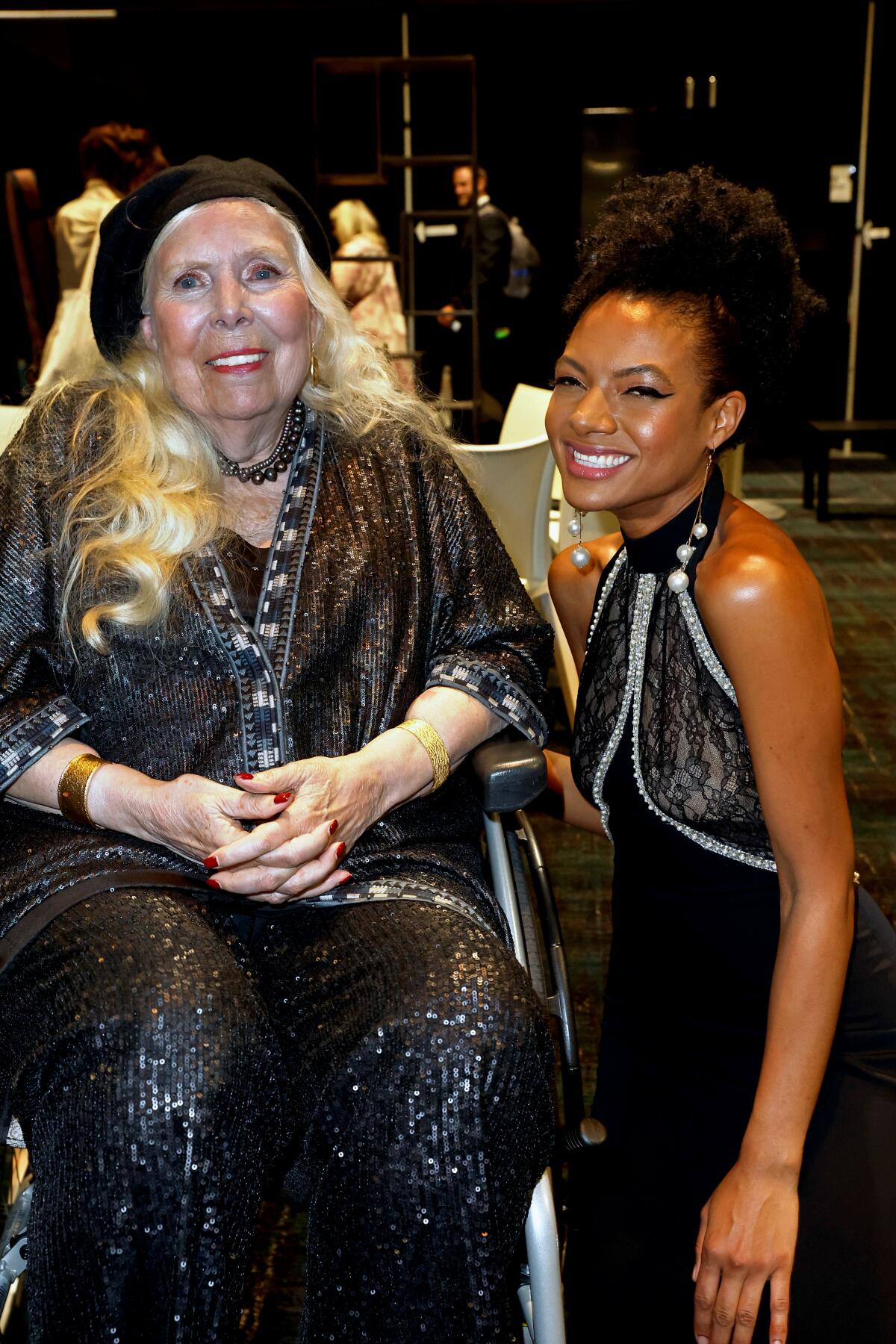
For all its welcome ebullience, “The Returner” — broadly tipped to fare well in Grammy nominations due to be announced Nov. 10 — is no bid for escapism. Russell is “leaning into joy as a form of resistance,” she says, framing the album as a response to what she sees as “one of the worst reactionary backlashes we’ve faced since the 1960s” as pertains to civil liberties and voting rights. “It’s absolute legislative terrorism across America, including here in my chosen home of Tennessee, where we’ve got rampant attempts to overturn democracy in the state.”
In the foot-stomping “Eve Was Black,” Russell ponders the ancient foundations of the racist ideology that centuries later would lead to her adoptive father’s abuse; “The Returner” closes with “Requiem,” a stirring lullaby shadowed by the creeping threat of gun violence like that seen in the shooting in March at Nashville’s Covenant School.
“It’s one of my deep, deep sorrows that I’ve been able to break cycles of abuse in our home but I’ve not been able to protect Ida from knowing that kids exactly her age were killed two blocks from her first school,” she says.
As Nashville increasingly splinters into factions, Jason Isbell continues to stand his ground — musically, politically — and gain audience with each new album.
Russell was born in Montreal to a white mom and a father from Grenada who left Canada before he knew Russell’s mother was pregnant. After her mom married a white man from a small town in Indiana, the couple took custody of Russell when she was 5; the abuse began soon and lasted until Russell ran away from home at age 15 — a harrowing episode she recounts in “Outside Child’s” “Persephone,” titled after the teenage girlfriend who offered her protection. Russell eventually moved to Vancouver and formed a band, Po’ Girl, in the early 2000s; a decade later, she started a duo, Birds of Chicago, with JT Nero, whom she married in 2013 and who co-produced “The Returner.” (She, Nero and Ida have lived in Nashville since 2017.)
The couple knew they wanted to enlist Wendy and Lisa in recording the new album; Russell says the genre- and identity-blurring music they made with Prince and on their own as a duo “helped me decolonize my mind after being raised by a maniacal white supremacist.” Russell’s friend Joe Henry made the introduction, which led to a get-to-know-you dinner at Musso & Frank and then to a breakneck six-day recording session at Henson that Russell calls “as exalted a creative barn-building as I could’ve dreamed of.”
“We were in that magical place where Joni recorded ‘Blue’ and ‘Court and Spark’ and Carole King recorded ‘Tapestry,’” Russell says of the storied complex on La Brea Avenue known in the ’70s and ’80s as A&M Studios. “The mojo was real.” Says Melvoin, who contributed guitar, bass and drums: “If you listen to this record and don’t feel the spirit we had in the room, you’re tone-deaf. It was so open and vulnerable and free.”
A ‘wrinkles and all’ new documentary, ‘I Am a Noise,’ surveys the life and career of singer-songwriter and activist Joan Baez.
Praise like that from a host of admiring veterans — Russell has also collaborated with Willie Nelson, Chaka Khan and Norah Jones, among others — has made the singer one of the most visible faces in the growing Americana scene, which she distinguishes from the mainstream country industry “because I see the community doing the tough work of self-examination and of swinging the door of acceptance wider.”
Yet she acknowledges that even Americana has work to do in terms of true diversity. “People can mean so well and still say the craziest s— to you,” she says. “‘You people are so soulful’ or ‘Music just oozes from your beautiful brown skin’ — stuff like that. And this is not my enemy. This is someone trying so hard to get over their own bias and fear and discomfort that they literally can’t see me. I’ve been called Mavis,” she adds of Mavis Staples, who recently turned 84. “I’ve signed Ruthie Foster CDs,” she says of the blues artist. Russell jokes that she formed a band with Rhiannon Giddens, Amythyst Kiah and Leyla McCalla — four Black female banjo players who made a 2019 album called “Songs of Our Native Daughters” — “just so people could see we were different people. That’s the force of tokenism.”
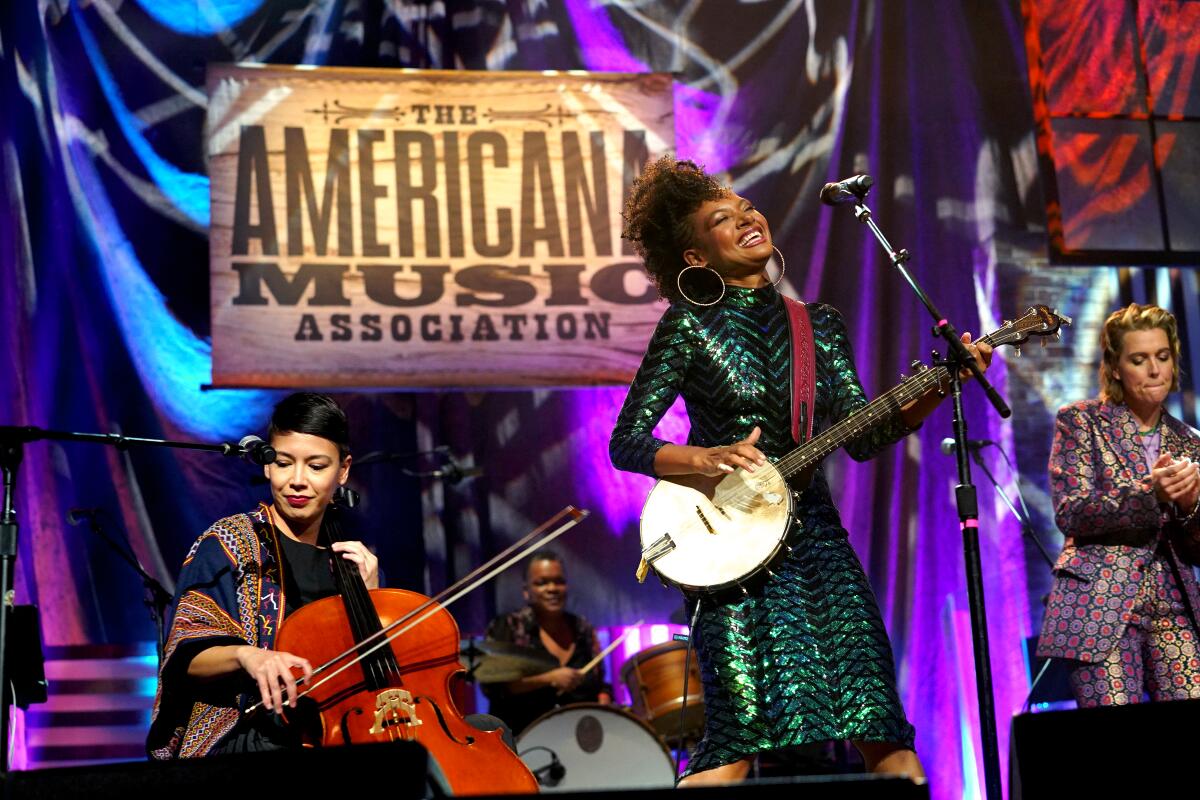
Asked what she makes of Luke Combs’ smash cover of Tracy Chapman’s late-’80s “Fast Car,” which sparked conversations about white privilege this summer when it charted higher than Chapman’s version did on Billboard’s Hot 100, Russell says, “I’m thrilled for Tracy because she owns her publishing and she’s taking that all the way to the bank. I get why for a lot of my community, it bums everybody out. But there is something that I think is the good work of allyship in the way Luke talks about his dad loving the original record and how driving around to it was as American an experience as driving around to a Garth Brooks record.”
Or perhaps a Taylor Swift one. Russell, who says her daughter is obsessed with the pop superstar, is fascinated by “the connection Taylor has forged with young girls in particular as they’ve moved through the various levels of trauma and angst of the pandemic.” Ida went to the Eras tour when it played Nashville in May — she was at the so-called rain show that ended past 1:30 a.m. — wearing an outfit inspired by Swift’s “Lover” era, Russell says.
“I went as ‘Speak Now’!” a young voice pipes up in the distance, correcting her mom.
“Sorry — fact-check,” Russell says with a laugh. “It was ‘Speak Now.’ My apologies. I’m just learning this canon.”
More to Read
The biggest entertainment stories
Get our big stories about Hollywood, film, television, music, arts, culture and more right in your inbox as soon as they publish.
You may occasionally receive promotional content from the Los Angeles Times.
